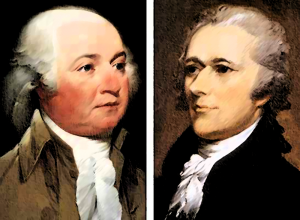When the colonies finally ousted the British and George Washington became the first president of the new nation, John Adams served as his vice-president. Meanwhile, the first Secretary of the Treasury was Alexander Hamilton.
Adams and Hamilton were both members of the Federalist Party, but they did not like each other. Adams looked at Hamilton as perverted, meddlesome, and deceitful. Hamilton viewed Adams as incompetent, arrogant, and short-tempered. Adams was running for re-election in 1800, and Hamilton wanted to avert another Adams presidency. And so, Hamilton wrote and published a pamphlet that contained arguments as to why Adams should not be president. To make Adams lose in the election, Hamilton only needed to persuade voters to cast their votes in favor of the other Federalist contender. He circulated his anti-Adams pamphlet among his fellow Federalists, but the papers soon made their way to the press.
Hamilton’s criticisms were about Adams’ international strategies. Adams was able to keep the United States from entering a war with France and was proud of this achievement. However, many criticized him for it. Many believed that Adams was too diplomatic with France, which was not good because it was a country that wanted America to lessen its business dealings with Great Britain. But the more straightforward part of Hamilton’s pamphlet was his sharp comments on how Adams treated his cabinet members. According to Hamilton, Adams’ fiery temper often caused him to speak in angry tones to the people who worked closely with him. He added that all of Adams’ ministers and members of Congress had been embarrassed by Adams’ bursts of anger. Adams was defeated by Thomas Jefferson, who became the third president of the United States, and his vice-president, Aaron Burr. Hamilton’s popularity suffered after he created hostilities with one of his fellow Federalists.
Around 1804, Adams discovered Hamilton’s efforts to make him lose in his re-election plans. Adams wrote to his wife, Abigail, and told her that he sees Hamilton as a proud and vain person who always pretends to be a moral one, although he was as immoral as Franklin. Adams added that although he admits Hamilton was talented, he fears none of his talents and that he looks at him as a puppy and plans to keep him away from him.
In 1804, Vice President Burr entered the race for the governorship of New York State. Hamilton engaged in a campaign against him, portraying him as not deserving to be trusted with government affairs. Burr felt offended at this and challenged Hamilton to a duel. Hamilton accepted the challenge, but during the duel, he missed his target. Burr fired at Hamilton and hit him in the abdomen. The bullet went through Hamilton’s ribs and lodged in his spine. Hamilton groaned, “I am a dead man,” then fell down. He died the following day.
Around five years after Hamilton’s death, Adams wrote a number of essays where he justified his decisions as president. In these essays, he scornfully called Hamilton “a little man” of “indelicate pleasures.”
